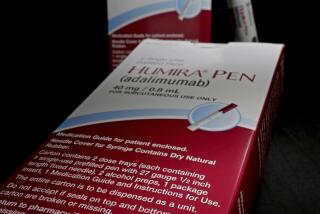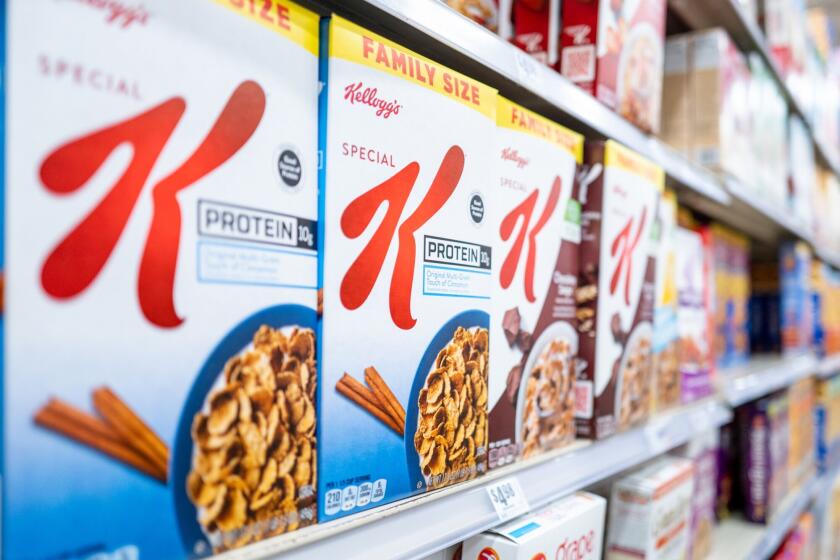Key Drug Patent Ruling Nears
- Share via
In the next few days, a federal judge in New York is expected to rule on the biggest drug patent case in history, one with enormous significance for consumers and drug manufacturers.
The fight over Prilosec, a heartburn drug that accounted for $3.7 billion in U.S. sales last year and was once the world’s best-selling medication, pits Europe’s No.2 drug maker, AstraZeneca, against four generic competitors. At issue is whether AstraZeneca can extend its patent on Prilosec, which expired in October, for several more years, thereby keeping cheaper alternatives off the market.
For the record:
12:00 a.m. May 31, 2002 For The Record
Los Angeles Times Friday May 31, 2002 Home Edition Main News Part A Page 2 National Desk 6 inches; 248 words Type of Material: Correction
Drug sales--A chart accompanying a story about a drug patent lawsuit in Tuesday’s Business section incorrectly listed the 2000 sales figures for 18 prescription medications whose patents will soon expire. The sales numbers were supposed to be stated in millions, not thousands.
U.S. District Judge Barbara S. Jones’ ruling comes at a time of unprecedented challenge in the pharmaceutical industry. The patents for 18 major brand-name drugs will expire in the next five years, potentially opening up $23.3 billion in annual sales to lower-priced competition. Half of those drugs, like Prilosec, are in the blockbuster category of a billion dollars and above in annual sales.
If AstraZeneca’s strategy for extending its patent on Prilosec succeeds, analysts say that will embolden other giants of the brand-name drug industry to follow suit. If AstraZeneca fails, it could be a boon for consumers--and for generic drug makers. Barr Laboratories gained $365 million in sales in just six months last year from its generic version of Prozac after Eli Lilly & Co.’s antidepressant went off patent.
AstraZeneca’s effort to extend its patent for Prilosec has become a bellwether of outrage over the cost of prescription drugs.
General Motors Corp., a member of the recently formed Business for Affordable Medicine coalition, said it spends $1 million a day on Prilosec for its employees. BAM claims that it will bring the clout of the nation’s largest businesses to bear on an effort to get generic drugs to market faster.
AstraZeneca was cited by the California State Employees Assn. as an example of how far brand-name drug companies will go to preserve a “competition-free climate” for their best-selling medications. Eighteen state governors wrote the Food and Drug Administration last year, urging the quick approval of a lower-priced version of Prilosec, which costs about $130 for a month’s supply. In Congress, the Prilosec case is used by critics to point out that the 1984 law governing generic competition is slanted in favor of brand-name companies and ought to be amended.
Few companies have launched a coordinated, global assault on the scale of AstraZeneca. It has sued 10 potential generic competitors of Prilosec, saying their copies of the medicine violate patents on the drug that are still valid. The main patent on Prilosec expired in October, but the company’s federal court case against Andrx Corp., Merck KGaA, Schwarz Pharma and Dr. Reddy’s Laboratories Ltd. argues that five other Prilosec patents are equally valid.
Three of those patents deal with the formulation of the pill and with its coating, which AstraZeneca claims is a unique three-layer barrier that protects the drug from stomach acids. If successful with its arguments that one or more of the patents is essential to the drug’s manufacture--and would represent an infringement on its rights should generic companies use them--AstraZeneca could retain exclusive rights to the drug’s sales through 2007 or even 2014.
On a parallel track, the company is pursuing an aggressive direct-to-consumer marketing strategy to switch current Prilosec users over to its next-generation anti-heartburn, anti-ulcer, acid reflux drug, Nexium. Both are based on the ingredient omeprazole.
Laurie B. Haber, analyst with New Vernon Associates, said the strategy to convert patients to Nexium is working, even though “we don’t feel that it is materially different from Prilosec. Nexium already has gained 20% of Prilosec’s market share in terms of new prescriptions.” Other analysts and experts say that 80% of today’s Prilosec users do not need to switch to Nexium.
A research report released today by the National Institute for Health Care Management said that producing slightly different versions of existing drugs to protect market share is a common tactic among major pharmaceutical companies.
The report found that two-thirds of the prescription drugs approved by the FDA between 1989 and 2000 were modified versions of existing medicines or identical to drugs already on the market; only about one-third were drugs based on new molecules that treat diseases in novel ways. And only 15% of drugs approved during the period used new chemical compounds as their active ingredients and were deemed by the FDA to provide significant improvement over existing medicines, the study said.
Drug makers face the difficult choice of breaking new scientific ground on a completely new drug or choosing the easier route of “modifying an older drug [that] enables a brand drug company to extend its intellectual property protection on the product. Such extensions, in turn, enable a brand company to delay generic competitors and maintain a high price for an aging product,” the report said.
The outcome of the Prilosec patent case weighs most heavily on Andrx and GenPharm, the two companies that share the lucrative first rights to market the generic equivalent to Prilosec for six months before other competitors can step into the market. Although those companies already have gained FDA approval to begin production of the generic version, doing so presents a huge financial risk to both companies.
If Andrx and GenPharm begin to sell the drug and lose the court case, either outright or on appeal, they will be liable not only for the sales they have accrued but also for substantial penalties for patent infringement. That’s why neither company has budged and is awaiting the outcome of the trial.
AstraZeneca’s strategy is almost bulletproof, financial analysts said.
“It’s a win-win for AstraZeneca,” said Todd Lebor, an analyst for Morningstar. “Every day that AstraZeneca delays generic competition with this case is another day in which they take in $12 million more in sales of Prilosec.”
Dr. Elliot Hahn, chief executive of Andrx, whose company could split an estimated $1 billion in generic Prilosec sales in just six months, said AstraZeneca “has raised delay tactics to an art form.”
Jim Coyne, senior manager for public affairs for AstraZeneca’s gastrointestinal group, denied that the court case is a stalling tactic designed to give the company more time to switch to Nexium. “Prilosec is a complex product. The formulation and the coating that allows this drug to be absorbed by the body deserves patent protection,” Coyne said.
Dr. Gregory Glover, a partner at Boston law firm Ropes & Gray and outside counsel to the pharmaceutical industry on intellectual property matters, said companies such as AstraZeneca, in aggressively protecting their patents, are only doing what’s necessary to ensure that there is sufficient money for future research.
“The amount of money spent on research and development by the brand-name pharmaceutical industry [more than $31 billion in 2001] shows that the science of developing these drugs is getting harder,” Glover said.
More to Read
Inside the business of entertainment
The Wide Shot brings you news, analysis and insights on everything from streaming wars to production — and what it all means for the future.
You may occasionally receive promotional content from the Los Angeles Times.











